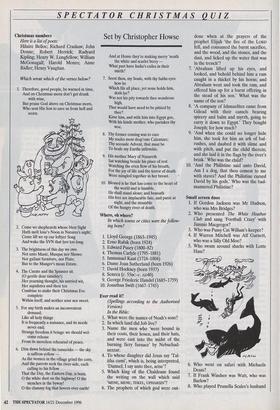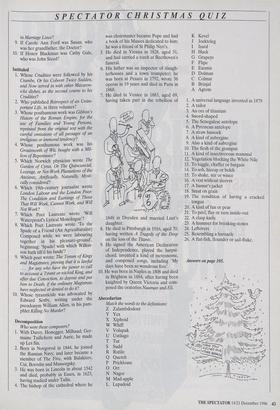SPECTATOR CHRISTMAS QUIZ Set by Christopher Howse
Christmas numbers Here is a list of poets: Hilaire Belloc; Richard Crashaw; John Donne; Robert Herrick; Rudyard Kipling; Henry W. Longfellow; William McGonagall; Harold Monro; Anne Ridler; Henry Vaughan.
Which wrote which of the verses below?
1. Therefore, good people, be warned in time, And on Christmas morn don't get drunk with wine,
But praise God above on Christmas morn, Who sent His Son to save us from hell and Scorn.
2. Come we shepheards whose blest Sight Hath melt loue's Noon in Natures's night; Come lift we vp our loftyer Song And wake the SVN that lyes too long.
3. The brightness of this day we owe Not unto Music, Masque nor Showe: Nor gallant furniture, nor Plate; But to the Manger's mean Estate.
4. The Curate and the Spinster sit.
(0 gentle dear timidity!) Her yearning thought, his untried wit, Her aspidistra and their tea Combine to make their Christmas Eve complete Within itself; and neither sour nor sweet.
5. For any birth makes an inconvenient demand; Like all holy things It is frequently a nuisance, and its needs never end; Strange freedom it brings: we should wel- come release From its merciless rehearsal of peace.
6. Dim dawn behind the tamarisks - the sky is saffron-yellow - As the women in the village grind the corn, And the parrots seek the river-side, each calling to his fellow That the Day, the Eastern Day, is born. 0 the white dust on the highway! 0 the stenches in the byway!
0 the clammy fog that hovers over earth! And at Home they're making merry 'neath the white and scarlet berry - What part have India's exiles in their mirth?
7. Seest thou, my Soule, with thy faiths eyes how he Which fils all place, yet none holds him, doth lye?
Was not his pity towards thee wondrous high.
That would have need to be pittied by thee?
Kisse him, and with him into Egypt goe, With his kinde mother, who partakes thy woe.
8. Thy former coming was to cure My smiles most desp'rate Calenture; Thy seconde Advent, that must be To heale my Earths infirmitie.
9. His mother Mary of Nazareth Sat watching beside his place of rest Watching the even flow of his breath, For the joy of life and the terror of death Were mingled together in her breast.
10. Blessed is he that has come to the heart of the world and is humble. He shall stand alone; and beneath His feet are implacable fate, and panic at night, and the strumble Of the hungry river of death.
Where, oh where?
In which towns or cities were the follow- ing born?
1. Lloyd George (1863-1945) 2. Erno Rubik (born 1924) 3. Edward Pusey (1800-82) 4. Thomas Carlyle (1795-1881) 5. Immanuel Kant (1724-1804) 6. Dame Joan Sutherland (born 1926) 7. David Hockney (born 1937) 8. Seneca (e. 55sc-c. A140) 9. George Friederic Handel (1685-1759) 10. Jonathan Swift (1667-1745) Ever read it? (Spellings according to the Authorised Version) In the Bible: 1. What were the names of Noah's sons?
2. In which land did Job live?
3. Name the men who 'were bound in their coats, their hosen, and their hats, and were cast into the midst of the burning fiery furnace' by Nebuchad- nezzar.
4. To whose daughter did Jesus say Tal- itha cumi', which is, being interpreted, 'Damsel, I say unto thee, arise'?
5. Which king of the Chaldeans found the writing on the wall which said
`IvIENE, MENE, TEICEL, UPHARSIN1
6. The prophets of which god were out- done when at the prayers of the prophet Elijah 'the fire of the LORD fell, and consumed the burnt sacrifice, and the wood, and the stones, and the dust, and licked up the water that was in the trench'?
7. 'Abraham lifted up his eyes, and looked, and behold behind him a ram caught in a thicket by his horns; and Abraham went and took the ram, and offered him up for a burnt offering in the stead of his son.' What was the name of the son?
8. 'A company of Ishmaelites came from Gilead with their camels bearing spicery and balm and myrrh, going to carry it down to Egypt.' They bought Joseph; for how much?
9. 'And when she could no longer hide him, she took for him an ark of bul- rushes, and daubed it with slime and with pitch, and put the child therein; and she laid it in the flags by the river's brink.' Who was the child?
10. 'And the Philistine said unto David, Am I a dog, that thou comest to me with staves? And the Philistine cursed David by his gods.' Who was the bad- mannered Philistine?
Small screen duos 1. If Gordon Jackson was Mr Hudson, who was Mrs Bridges?
2. Who presented The White Heather Club and sang 'Football Crazy' with Jimmie Macgregor?
3. Who was Pussy Cat Willum's keeper?
4. If Warren Mitchell was All Garnett, who was a Silly Old Moo?
5. Who swam around sharks with Lotte Hass?
6. Who went on safari with Michaela Denis?
7. If Frank Windsor was Watt, who was Barlow?
8. Who played Prunella Scales's husband in Marriage Lines?
9. If Carole Ann Ford was Susan, who was her grandfather, the Doctor?
10. If Honor Blackman was Cathy Gale, who was John Steed?
Intituled 1. Whose Crudities were followed by his Crambe, Or his Colwort Twice Sodden, and Now served in with other Macaron- icke dishes, as the second course to his Crudities?
2. Who published Retrospect of an Unim- portant Life, in three volumes? 3. Whose posthumous work was Gibbon's History of the Roman Empire, for the use of Families and Young Persons, reprinted from the original text with the careful omissions of all passages of an irreligious or immoral tendency? 4. Whose posthumous work was his Groatsworth of Wit, bought with a Mil- lion of Repentance? 5. Which Norwich physician wrote The Garden of Cyrus, Or The Quincuncial, Lozenge, or Net-Work Plantations of the Ancients, Artificially, Naturally, Mysti- cally considered? 6. Which 19th-century journalist wrote London Labour and the London Poor The Condition and Earnings of Those That Will Work, Cannot Work, and Will Not Work?
7. Which Poet Laureate wrote 'Will Waterproofs Lyrical Monologue'? 8. Which Poet Laureate wrote 'To the Spade of a Friend (An Agriculturalist) Composed while we were labouring together in his pleasure-ground', beginning: 'Spade! with which Wilkin- son hath till'd his lands'?
9. Which poet wrote: The Tenure of Kings and Magistrates, proving that it is lawful . for any who have the power to call to account a Tyrant or wicked King, and after due Conviction, to depose and put him to Death, if the ordinary Magistrate have neglected or denied to do it? 10. Whose tyrannicide was advocated by Edward Sexby, writing under the pseudonym William Allen, in his pam- phlet Killing No Murder?
Decomposition Who were these composers? 1. With Durey, Honegger, Milhaud, Ger- maine Tallleferre and Auric, he made up Les Six. 2. Born in Novgorod in 1844, he joined the Russian Navy, and later became a member of The Five, with Balakirev, Cui, Borodin and Mussorgsky.
3. He was born in Lincoln in about 1542 and died, probably in Essex, in 1623, having studied under Tanis. 4. The bishop of the cathedral where he was choirmaster became Pope and had a book of his Masses dedicated to him; he was a friend of St Philip Neri's.
5. He died in Vienna in 1828, aged 31, and had carried a torch at Beethoven's funeral.
6. His father was an inspector of slaugh- terhouses and a town trumpeter; he was born at Pesaro in 1792, wrote 36 operas in 19 years and died in Paris in 1868.
7. He died in Venice in 1883, aged 69, having taken part in the rebellion of 1848 in Dresden and married Liszt's daughter.
8. He died in Pittsburgh in 1916, aged 70, having written A Tragedy of the Deep on the loss of the Titanic.
9. He signed the American Declaration of Independence, played the harpsi- chord, invented a kind of metronome, and composed songs, including 'My days have been so wondrous free'.
10. He was born in Naples in 1808 and died in Brighton in 1884, after having been knighted by Queen Victoria and com- posed the oratorios Naaman and Eli.
Abecedarian Match the words to the definitions: Z Zalambdodont Y Yex X Xiphoid W Whiff V Volapuk Ustilago Tut Sudd Rutile Quetch Pricldouse 0 Ort Nagor Mad-apple Lepadoid K Kevel J Jockteleg I Izard H Huck G Grapeys F Flipe E Exomis D Dolman C Colmar B Brinjal A Agrom 1. A universal language invented in 1879 2. A tailor 3. An ore of titanium 4. Sword-shaped 5. The Senegalese antelope 6. A Pyrenean antelope 7. A straw hassock 8. A kind of aubergine 9. Also a kind of aubergine 10. The flesh of the grampus 11. A kind of insectivorous mammal 12. Vegetation blocking the White Nile 13. To higgle, chaffer or bargain 14. To sob, hiccup or belch 15. To shake, stir or wince 16. A vest without sleeves 17. A hussar's jacket 18. Smut on grain 19. The condition of having a cracked tongue 20. A kind of fan or pear 21. To peel, flay or turn inside-out 22. A clasp knife 23. A hammer for breaking stones 24. Leftovers 25. Resembling a barnacle 26. A flat-fish, flounder or sail-fluke.
Answers on page 105.



















































































































 Previous page
Previous page